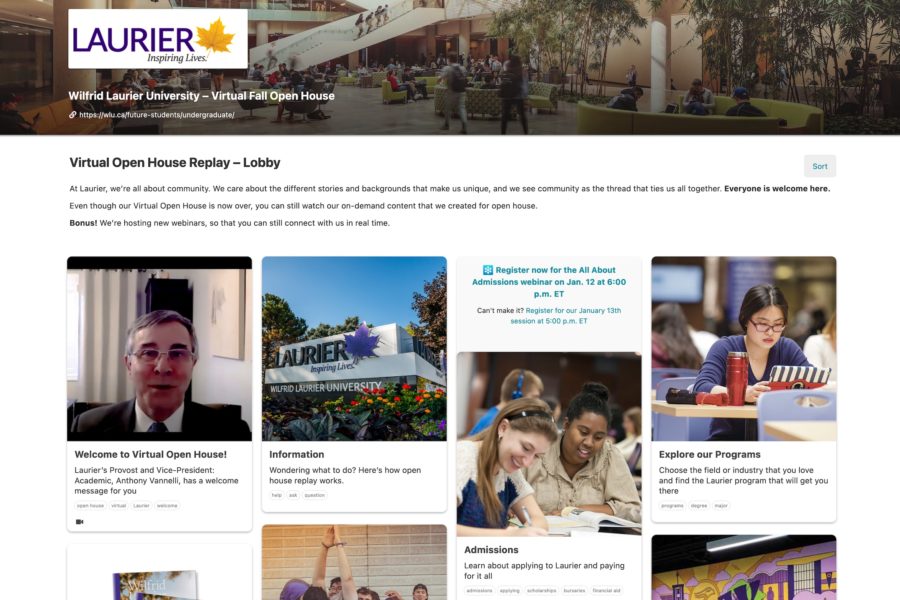Orientation week is a pivotal event to help new higher education students bond with your school. Orientation is your school’s opportunity to get a student’s education experience kicked off on the right foot. In-person orientation usually takes place for about a week. During this week, students engage with a series of events, have the opportunity to mingle, and learn more about the school’s services.
Over the last few years, we’ve run many student engagement events, from open houses to research symposiums, all the way to events for exam preparation and student de-stressors. We’ve used these events to discover crucial insights into what students expect from online event experiences.
This article will highlight some key areas that can help you run successful online student orientation events.
1. Make it EASY
For first-year students, it can be an overwhelming period. It will represent the most significant environment shift they’ve ever experienced in their lives for many students. With so many changes in their lives, the last thing any student wants is to figure out and navigate a jam-packed and overwhelming school orientation week. As an orientation planner, you want to do your best to simplify the orientation experience for students.
A key aspect to simplifying the navigation experience is to minimize the amount of reading students need to process to access event activities. Do your best to make the experience highly visual – with images that will engage and excite students about the available opportunities during orientation. Students are immersed in TikTok and Instagram and respond better to visual cues than web page listings.
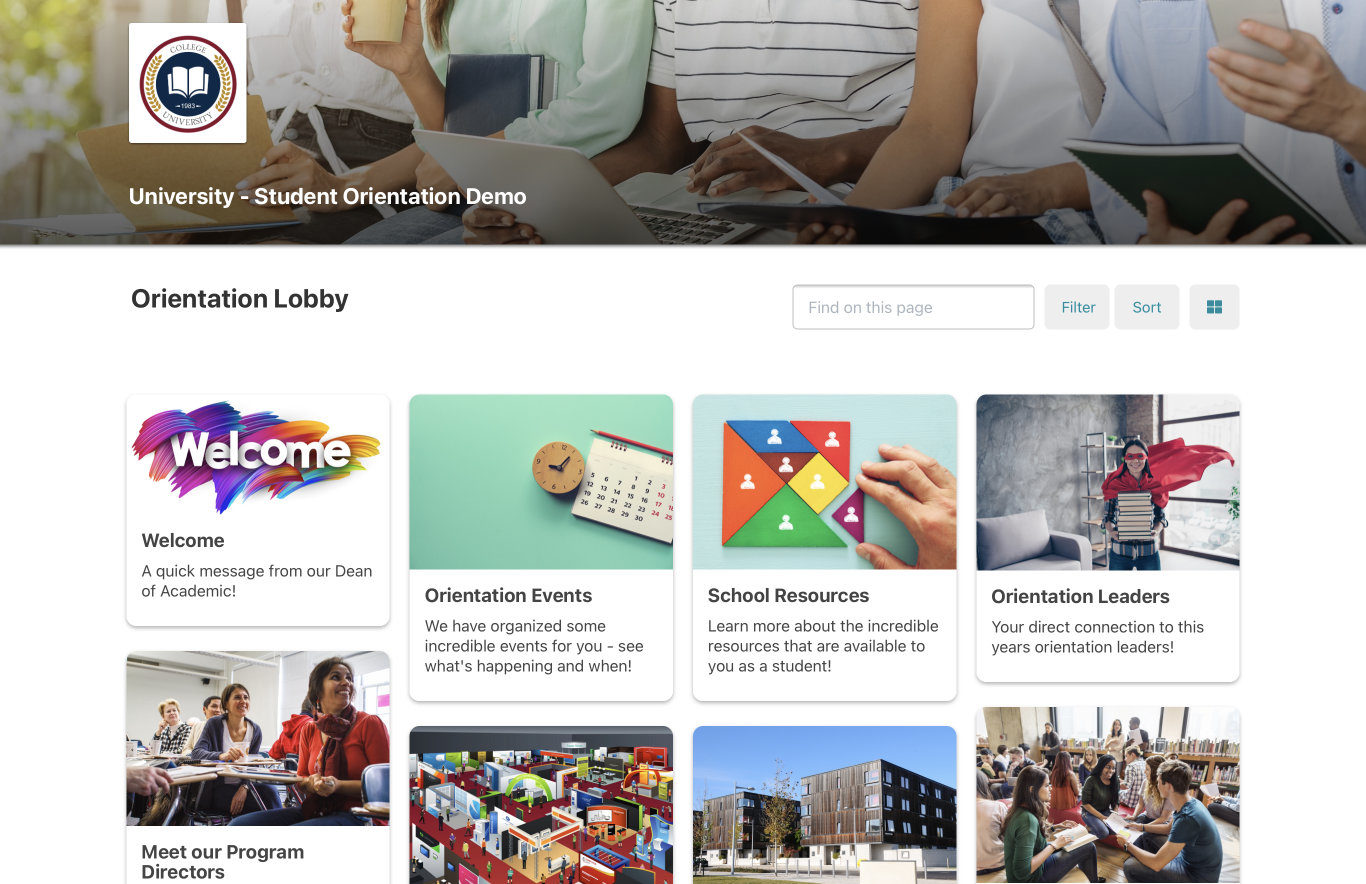
You also want to avoid complicated event schedules or have students join a series of Zoom/online calls, which students have told us can be exhausting. An excellent way to break up the monotony of live sessions and allow your online student orientation to ‘breathe’ is to place key event breaks to enable students to be more exploratory and access content on-demand. For example, a networking or mentorship zone, a company sponsorship hall with give-aways, a student clubs showcase zone, a games-room zone, and more.
2. Think about the experience from the students’ point of view
We’ve been fortunate to speak with highly experienced orientation week coordinators across North America, and we’ve also been able to talk to first, second, third, and fourth-year students. Interestingly, students tell us that there are two big highlights or attractions for them during orientation week:
(1) the exhibitors and companies that give students unique deals and promotions and
(2) finding and learning about relevant clubs and social circles to join to make friends around their interests and affinities.
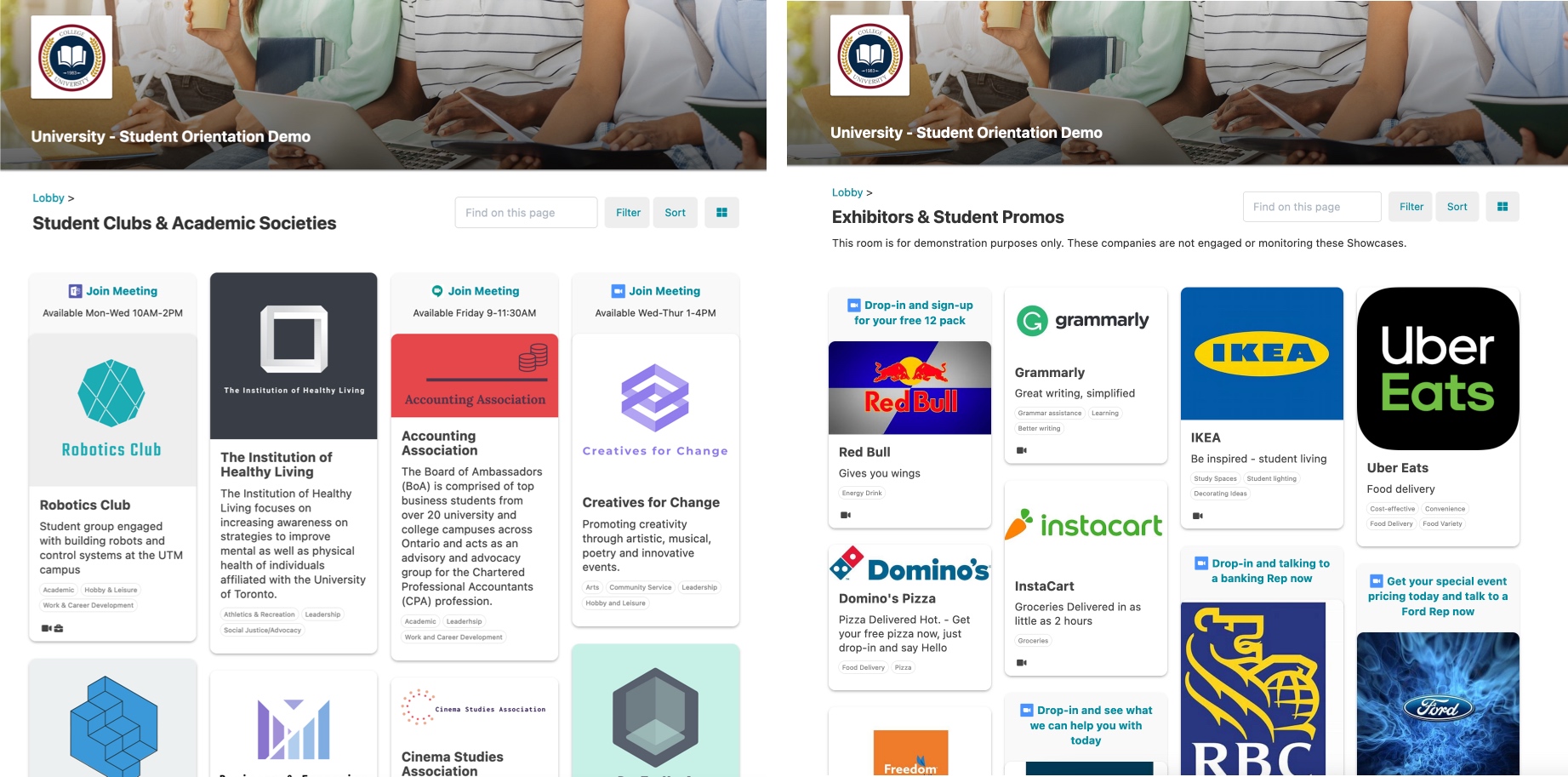
These two highlights are often placed on the back burner by coordinators when planning online orientation events. They are unsure how to fit these elements alongside the more traditional orientation week events in the online environment. It is easier to organize school resources, but a lot of the value of orientation week to students are social events that welcome them to the community and enable them to plant strong social roots that make them feel they belong. In this sense, orientation week is a critical retention tool for schools.
3. Leverage the benefits of online by staging your orientation
In-person orientation weeks are typically framed and managed within the limitations of location and time. Students need to be at a particular place to see a specific faculty member at a certain time. If they miss that session, then they will typically lose access to critical information or experiences. Online student orientation provides a unique opportunity to overcome this limitation. Within an online orientation week, you have the chance to create live, on-demand, and blended experiences. You also have the opportunity to segment content that needs to be consumed live and content that can be seen ahead of time by students or seen after orientation week by those who may not have had the time.
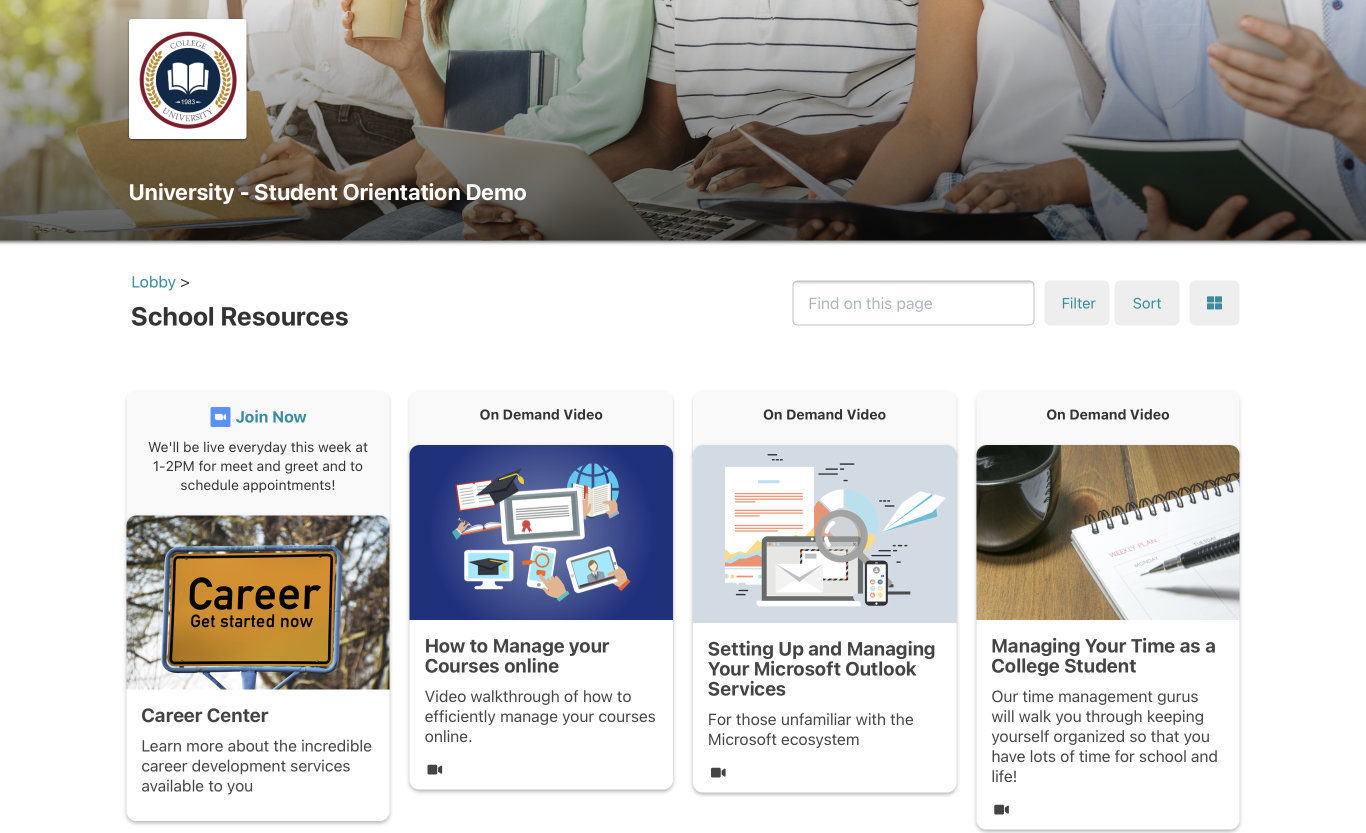
For example, students can access some resources ahead of time on demand, like tips and tricks on getting the most out of the LMS or an info session on academic writing and then mixing in Live sessions from key professors and campus leaders to address more targeted questions. You can also blend the two, combine a pre-recorded talk with the recreation center (gym), and provide a live QA session with a representative for students to talk to. This flexibility is an exciting lens to view planning an orientation week with and can dramatically increase student access to campus resources and be a differentiator for schools with more developed student resources seeking more avenues for student engagement with these resources and improving their ROI.
4. Find ways to get current students engaged and involved in the online orientation
Many online orientation weeks lack support from existing students. The lack of student involvement can make the event feel more clinical and boring for incoming students. So greater student involvement can make orientation week festivities more genuine but can also dramatically improve participation. We often see 10-20X greater student participation in school online events run by students during the regular year versus those organized solely by school administrators. Why? They ensure they invite their friends and their network to participate. They can influence and promote an online event far better than most school event organizers.
A great way to get students engaged is to ensure that your student clubs have a fundamental role to play. School clubs are always interested in easy and convenient opportunities to promote their name and recruit new members. Student club involvement gives your orientation week two key features. It allows incoming students to identify and join relevant clubs more quickly, and the additional voices create campus-like energy. A school club fair organized as a part of orientation week also allows for earlier student networking and relationship-building.
Other vital members that you should consider involving are orientation leaders, student’ mentors,’ residence dons, and other campus student leaders.
5. Don’t ask students to download an app, but be ready for mobile
The world is going increasingly mobile. We see as much as 30% of online academic event participants joining using their smartphone devices (some open house events we have run have over 50% smartphone access). To serve this audience better, many orientation coordinators make the mistake of working with virtual event platforms requiring a dedicated app to run their orientation week.
Using a dedicated smartphone app can be counterproductive for events like student orientation. When students already have a whole slew of new apps to install (LMS, Email to setup, etc.), installing an app for a singular event can be seen as an unnecessary complexity and often discourages large groups of students from participating. Instead, you want to ensure that your online orientation can be instantly opened on any smartphone device using a hyperlink. Avoiding a dedicated app also enables you to have a more consistent experience across smartphones and desktop devices.
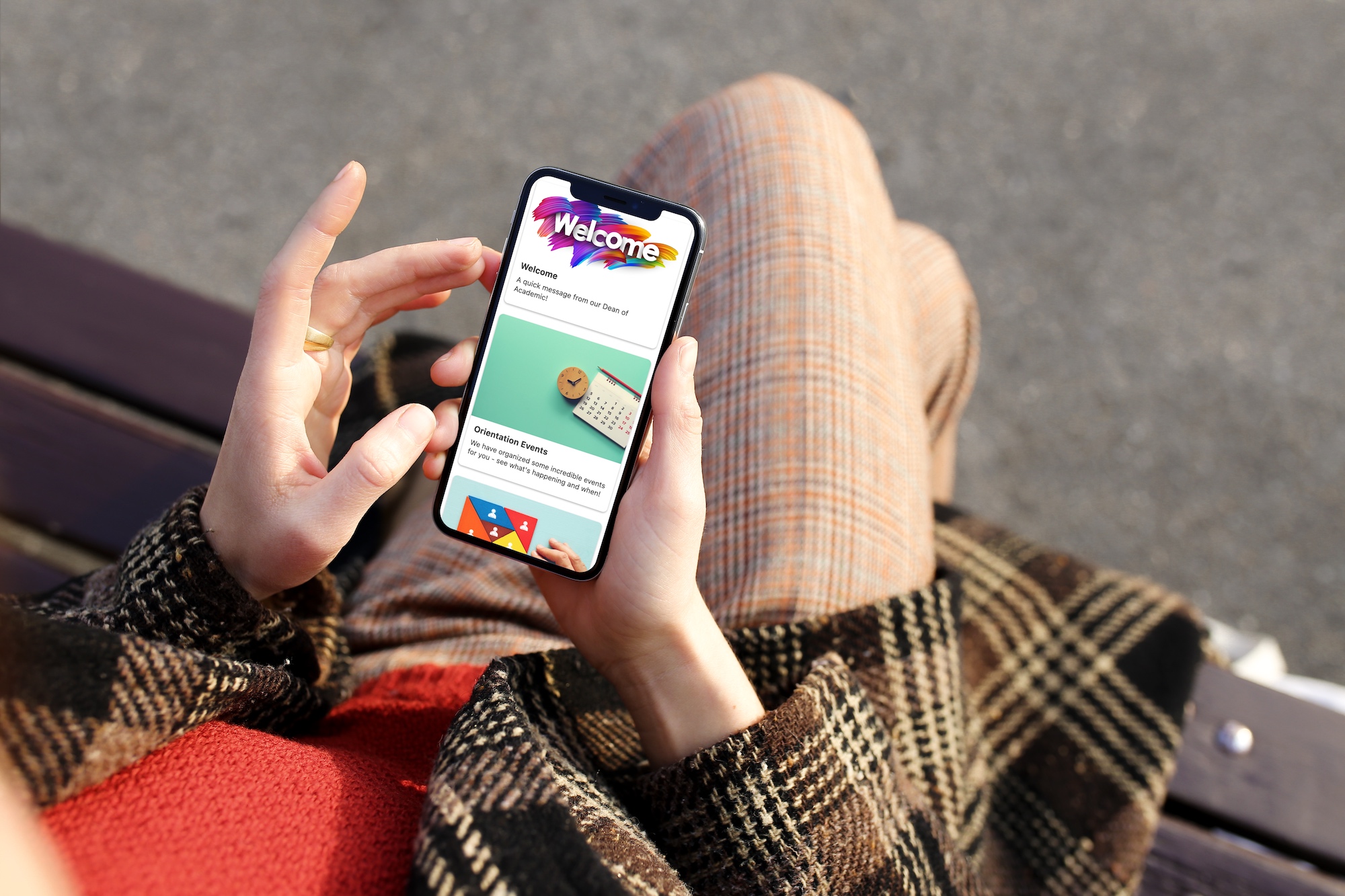
In Closing
Student expectations when it comes to school events are shifting. There are increasing expectations for schools to provide a well-thought-out digital alternative to on-campus events. Schools should see this as an opportunity to provide their students with a more robust student experience while simultaneously ensuring a legitimate backup solution for students who cannot attend in-person campus events (weather conditions, pandemic restrictions, travel, or timing issues).
I hope that this article has given you some insights or, at the very least, some food for thought as you think about your student orientation events. We are currently at an exciting juncture in figuring out how academia leverages online technologies to provide next-level experiences for their students. We have made a demo of a online student orientation event that you can explore. If you are interested in how Acadiate can support your events, don’t hesitate to reach out to us, we’d love to talk!


